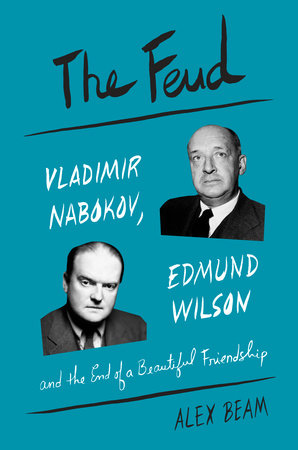Introduction I first learned of the friendship and subsequent feud between Edmund Wilson and Vladimir Nabokov only a few years ago. A friend of mine had been tracking down Alexander Pushkin’s descendants—there are a few—and mentioned in passing that Wilson and Nabokov had ended a quarter-century-long friendship because of a disagreement over how to translate Pushkin’s novel in verse
Eugene Onegin. I burst out laughing. It was the silliest thing I had ever heard.
I hadn’t known about this famous contretemps because I was eleven years old in 1965, when Wilson trained his guns against his longtime comrade in letters—”a personal friend of Mr. Nabokov . . . an admirer of much of his work,” as he introduced himself in a salvo of ill-will splattered across the pages of
The New York Review of Books. I wasn’t reading the
Review, then in its third year of publication, and it certainly wasn’t lying around my parents’ house. I was reading
Boys’ Life, what the Russians would call the “organ” of the Boy Scouts of America. I think Vladimir Nabokov, he of the wondrous outdoorsy boyhood, would have approved.
I know a thing or two about Russian language and literature—my harshest readers will confirm that modest count—but I had never read
Onegin, and was familiar with only the highest peaks of Nabokov’s astonishing range:
Lolita and
Speak, Memory. There was a time when college students with literary pretensions read Edmund Wilson, but it wasn’t my time. When I graduated in 1975, Wilson had been dead for three years, with his literary renown and influence already in deep eclipse.
Several years into this project, I laugh less now. Of course the pedantic exchanges between two eminent men of letters still ring silly—is
pochuya, which could mean “sensing,” or “sniffing,” a present or past gerund? (Good question!) Did Pushkin know English well enough to read Byron? (Maybe.) But the end of a friendship is always a loss. Especially a friendship so deeply and mutually celebratory as this one. “Edmund was always in a state of joy when Vladimir appeared,” Wilson’s third wife, Mary McCarthy, recalled. “They had an absolute ball together. He loved him.”1 Their correspondence was legendary, full of rambunctious exchanges about literature, gossip, sex in taxicabs, sore gums, and very genuine emotions. “You are one of the few people in the world whom I keenly miss when I do not see them,” Nabokov wrote to Wilson eight years into their friendship.2
And then, nothing.
Like so many intimate relationships, this one bore the seeds of its own destruction. In one of his very first letters to his new acquaintance, Wilson scores Nabokov for his punning, which Wilson finds tiresome. But of course it is irrepressible, and will continue throughout his life. Nabokov’s last major novel,
Ada—the title itself a pun, alluding to “ardor,” and to the Russian
ah, da (oh, yes)—mentions Mr. Eliot’s famous poem, “The Waistline”; and so on,
ada infinitum. In many ways the two men proved to be two entirely different and contradictory people, Wilson the erudite literalist and Nabokov the ludist, the fantasist, the trickster king. The opposites attracted, and then they didn’t.
When their friendship ended, much was made of the fact that Wilson never reviewed any of Nabokov’s novels. Indeed Nabokov himself complained in a gift inscription to Wilson, “Why do you never review my works?” But it is very hard to imagine Wilson enjoying, say,
The Gift, Nabokov’s favorite of his own Russian novels.
The Gift would have infuriated Wilson. It is simultaneously a work of literary criticism, a memoir of the Russian emigration in Germany, and a complicated gloss on Pushkin’s
Onegin. The Gift incorporates a novella-length, jocoserious “biography” of Nikolai Chernyshevsky, a sacred figure of nineteenth-century socialism whom Nabokov mercilessly lampoons.
It is supremely Nabokovian; a novel, and not a novel. And it ends with a perfectly crafted
Onegin stanza, Nabokov’s knowing nod to his favorite Russian writer. That stanza appears on—but I anticipate.
It is equally hard to imagine Nabokov reading, savoring, or even understanding
Patriotic Gore, Wilson’s unsentimental, revisionist overview of the literature and the mythopoeia that animated the combatants in America’s Civil War. Wilson spent more than ten years researching the book. It is difficult to envision Nabokov spending even ten minutes perusing its index. When Gore appeared in 1962, Nabokov had already ensconced himself in Switzerland, settled atop a pile of money from the fabulous sales of his novel
Lolita. America, and Edmund Wilson, were only faintly visible in his rearview mirror.
Let me make two quick points:
Told from such a distance in time, this becomes a story of unequal combat. Nabokov is very much alive in his work, perhaps less on the night table than on the college syllabus, but nonetheless he remains known to millions. Not so Wilson. In the years leading up to his death in 1972, “he was not much read,” his friend Jason Epstein wrote in a heartfelt obituary. Once hailed as the “dean of American letters,” possessed of what the biographer Leon Edel called “a certain Johnsonian celebrity,” Wilson is largely unknown today. When I mentioned Wilson’s name to a participant at a donors’ event at the Boston Public Library, his reply was: “It’s weird how he makes everything about ants.” No, that is Edward O. Wilson, the Harvard professor and author of
The Ants, The Anthill, and
Journey to the Ants. Edmund Wilson was someone else entirely.
Second: There seems to be an infectious tendency to “go Nabokovian” when writing about the late, great novelist. Andrew Field, Nabokov’s first biographer, decided not to include an index with his biography, a complicated and annoying homage to his subject, who sometimes bent indexes to his own playful needs. When Wilson’s biographer Jeffrey Meyers wrote about the Nabokov-Wilson feud, he couldn’t resist the easily available pun “when Pushkin came to shovekin.”3 Douglas Hofstadter, the Pulitzer Prize–winning author of
Gödel, Escher, Bach, who spent two years translating
Onegin with great élan, fell into pun-ditry himself, asserting his right to “poetic lie-sense,” and so on.
I myself succumbed. It is futile to resist the lure of such pseudo-verbs as “pedanitifies,” or to ignore the temptation to tack footnote after footnote onto my explanation of
Onegin’s scintillating “Pedal Digression.” When I needed to cite an
Onegin translation, I quoted from the late Walter Arndt’s version, just because I knew that would irk the Nabokovian shade. Nabokov hated Arndt’s
Onegin. I call Vera Nabokov “Vera Nabokova” in part because that is how she signed her name, but also to fingernail-scratch the Elysian blackboard where the Master may currently be lecturing. He inveighed against the feminization of Russian family names, and insisted on teaching
Anna Karenin, never
Anna Karenina. These are pure Nabokovian impulses. Literary confrontations were to be pursued in this life and the next. When revising his
Onegin translation after Wilson’s death, Nabokov urged his publisher to shake a leg: “I would like to see my edition printed before confronting an irate Pushkin and a grinning E. Wilson beyond the cypress curtain.”
A feud unto death, and beyond. As we shall see, Wilson attacked Nabokov from beyond the grave, affording himself a satisfaction we cannot yet fully appreciate. In the five years that he outlived Wilson, Nabokov, too, tap-danced on his old rival’s tombstone, in a manner unbecoming the international celebrity and self-proclaimed genius that he was. And then Nabokov’s son, Dmitri—but again, I anticipate.
In a famous essay, Ralph Waldo Emerson wrote that “friendship, like the immortality of the soul, is too good to be believed.”
In the case of Nabokov and Wilson, it was.
Copyright © 2016 by Alex Beam. All rights reserved. No part of this excerpt may be reproduced or reprinted without permission in writing from the publisher.






